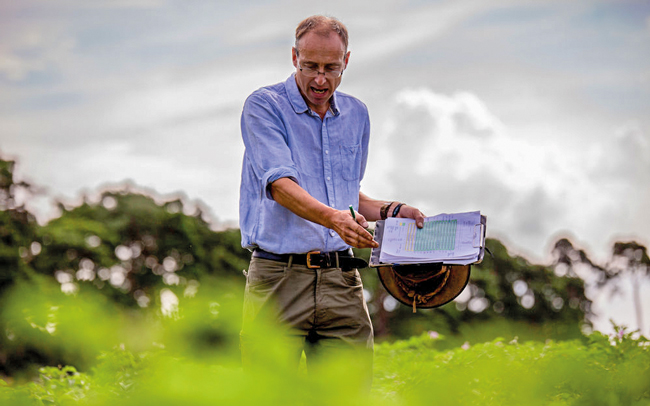Looking for alternatives after diquat withdrawal
7th March 2019
For UK potato growers, the news that diquat has had its approval withdrawn by the EU Commission, will have come as a major blow that could see herbicide and mechanical defoliation costs soar.

Graham Tomalin talking at an AHDB SPot farm event.
For UK potato growers, the news that diquat has had its approval withdrawn by the EU Commission, will have come as a major blow that could see herbicide and mechanical defoliation costs soar.
Following the Appeal Committee meeting on 12 July 2018, in which no opinion was reached regarding a proposal from the European Commission to withdraw the approval of diquat, the European Commission has decided to implement its proposal not to renew its approval in the EU.
This decision applies to all products containing diquat, and was based on concerns related to the precautionary principle of exposure as well as danger to birds. The European Commission has proposed that diquat is withdrawn from the market by 4th May 2019, with a use-up period for growers by 4th February 2020.
Although more specific details of use up and sell-out periods have yet to be ratified, growers are looking to alternative methods to ensure continuity of weed control in pre-emergence and early post-emergent situations and cost-effective alternatives to diquat desiccation.
Independent potato agronomist Graham Tomalin who advises growers on early, second early and main crop varieties for mainly pre-pack and processing markets across Suffolk and Norfolk, believes that adequate weed control can still be achieved.
Although diquat is still relevant for the 2019 growing season, Mr Tomalin believes that the alternatives of Shark (a micro-emulsion (ME) formulation containing 60g/litre carfentrazone) and Gozai (pyraflufen) can still be as reliable especially when used in tandem or in a programme with residual products such as metribuzin/metobromuron/prosulfocarb.
“It’s important to use these products in combination to suit the situation and weed spectrum,” explains Mr Tomalin. “There is no stand alone option and in the absence of diquat, we shall have to tailor our programmes more specifically.”
Pre-emergence
Shark can be used pre-emergence at up to 0.33-litres/ha up to a tolerance of 5 per cent emergence in first earlies and 10 per cent in second earlies and main crop. It is very important not to delay crop growth by applying the product beyond these timings. It also provides broad-spectrum contact activity across a range of broad-leaved weeds including polygonums, brassica weeds, fat hen and cleavers.
The contact activity serves to replace the diquat element as a viable alternative and Mr Tomalin believes that in-field trials this year alongside diquat will give growers confidence going forward. However it will be important not to exceed the emergence levels as the products are harsher on any emerged crop than diquat.
“I believe we can manipulate our pre-emergence programmes well enough to accommodate the loss of diquat by using these products, although the bigger issue will be at haulm destruction where diquat has been so essential for defoliation,” he says. “The only other effective option for large or immature canopies is flailing and this will undoubtedly increase, although as with any mechanical process, it will mean increased cost.”
Spotlight (also 60g/litre carfentrazone) is still highly effective for stem destruction, but in many varieties that have dense canopies, the only real way to remove the leaf foliage will be flailing. Mr Tomalin believes that this will be much easier to manage on lighter land crops lifted earlier in the season, but for late-lifted crops on heavy land the increased traffic under unsuitable field conditions could prove costly.
“Under wet conditions on heavier soils, increased mechanical damage to both soil and crop could be an issue,” he continues. “Smearing of the soil could lead to conditions that affect soil structure and expose crop to greening and potentially slower harvest. It’s an effective process but not in every situation.
“Further information regarding the sell-out of diquat and use-up dates issued by CRD is still to be announced, but at least we do have options,” he confirms.
